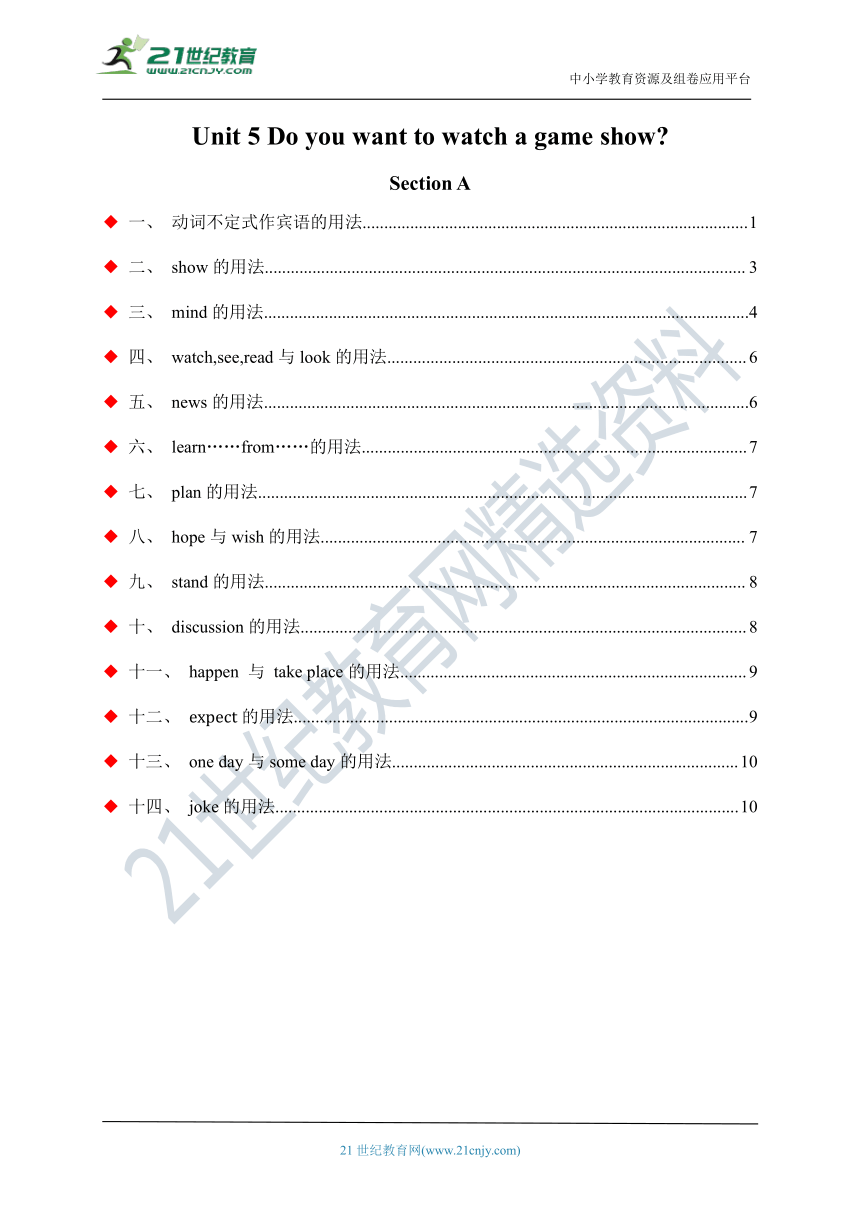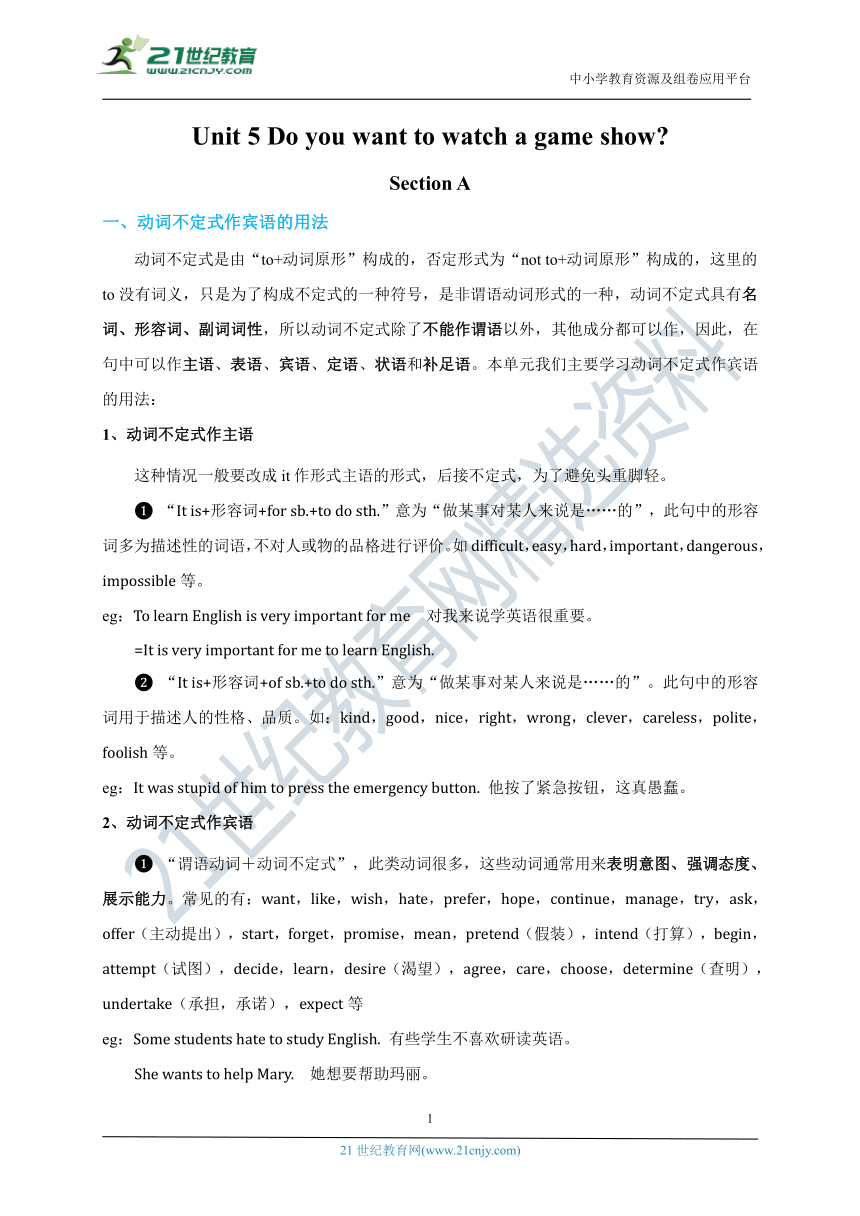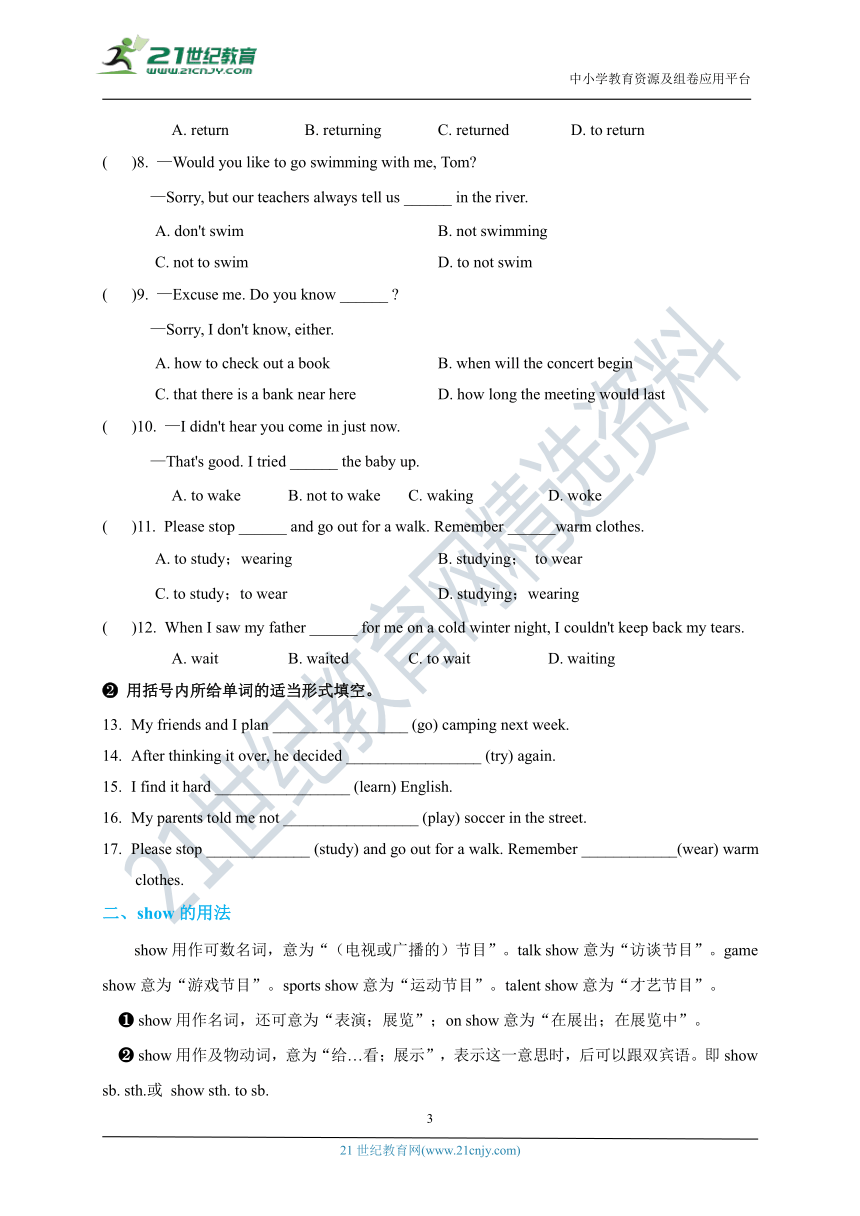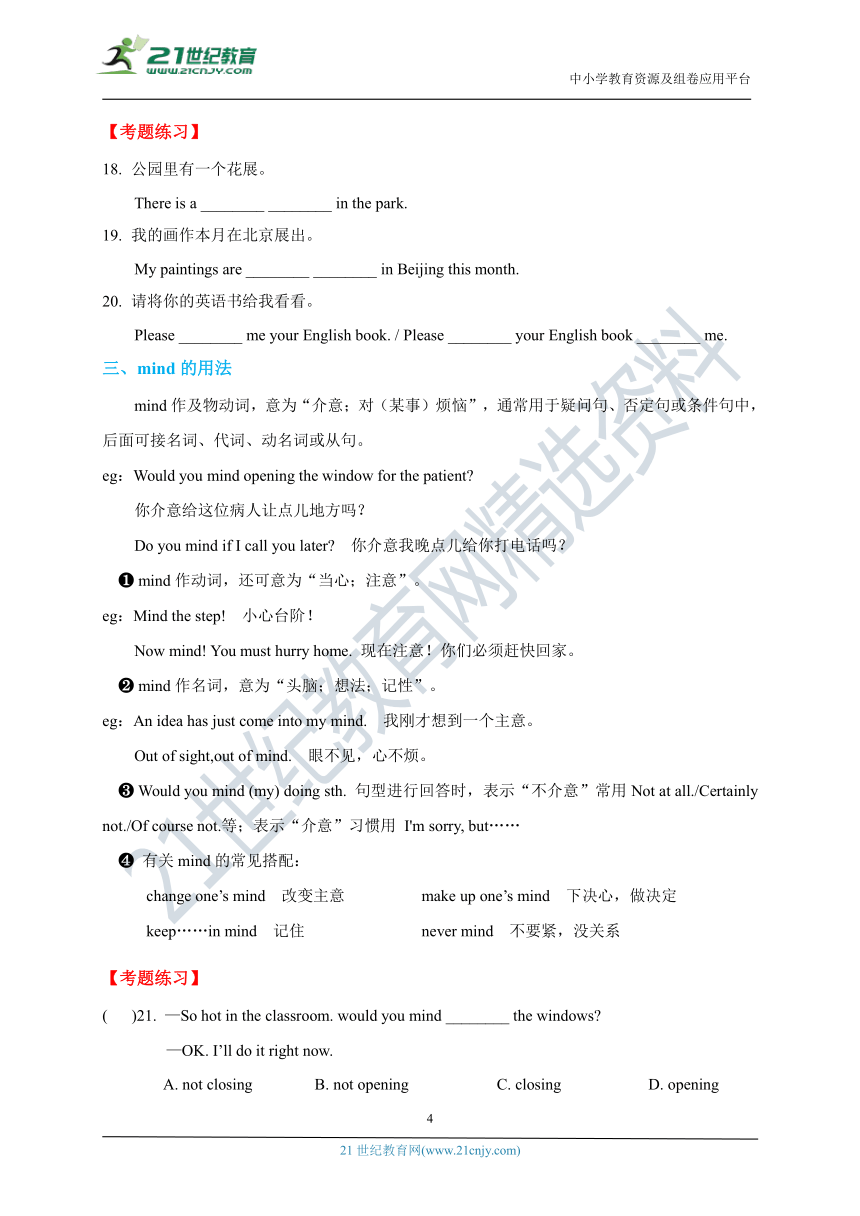Unit 5 Do you want to watch a game show Section A 重要知识考点+练习过关 (含答案)
文档属性
| 名称 | Unit 5 Do you want to watch a game show Section A 重要知识考点+练习过关 (含答案) |

|
|
| 格式 | docx | ||
| 文件大小 | 1018.5KB | ||
| 资源类型 | 试卷 | ||
| 版本资源 | 人教新目标(Go for it)版 | ||
| 科目 | 英语 | ||
| 更新时间 | 2021-09-16 00:00:00 | ||
图片预览





文档简介
Unit
5
Do
you
want
to
watch
a
game
show?
Section
A
一、
动词不定式作宾语的用法
1
二、
show的用法
3
三、
mind的用法
4
四、
watch,see,read与look的用法
6
五、
news的用法
6
六、
learn……from……的用法
7
七、
plan的用法
7
八、
hope与wish的用法
7
九、
stand的用法
8
十、
discussion的用法
8
十一、
happen
与
take
place的用法
9
十二、
expect的用法
9
十三、
one
day与some
day的用法
10
十四、
joke的用法
10
中小学教育资源及组卷应用平台
21世纪教育网
www.21cnjy.com
精品试卷·第
2
页
(共
2
页)
21世纪教育网(www.21cnjy.com)
Unit
5
Do
you
want
to
watch
a
game
show?
Section
A
动词不定式作宾语的用法
动词不定式是由“to+动词原形”构成的,否定形式为“not
to+动词原形”构成的,这里的to没有词义,只是为了构成不定式的一种符号,是非谓语动词形式的一种,动词不定式具有名词、形容词、副词词性,所以动词不定式除了不能作谓语以外,其他成分都可以作,因此,在句中可以作主语、表语、宾语、定语、状语和补足语。本单元我们主要学习动词不定式作宾语的用法:
1、动词不定式作主语
这种情况一般要改成it作形式主语的形式,后接不定式,为了避免头重脚轻。
?
“It
is+形容词+for
sb.+to
do
sth.”意为“做某事对某人来说是……的”,此句中的形容词多为描述性的词语,不对人或物的品格进行评价。如difficult,easy,hard,important,dangerous,impossible等。
eg:To
learn
English
is
very
important
for
me
对我来说学英语很重要。
=It
is
very
important
for
me
to
learn
English.
?
“It
is+形容词+of
sb.+to
do
sth.”意为“做某事对某人来说是……的”。此句中的形容词用于描述人的性格、品质。如:kind,good,nice,right,wrong,clever,careless,polite,foolish等。
eg:It
was
stupid
of
him
to
press
the
emergency
button.
他按了紧急按钮,这真愚蠢。
2、动词不定式作宾语
?
“谓语动词+动词不定式”,此类动词很多,这些动词通常用来表明意图、强调态度、展示能力。常见的有:want,like,wish,hate,prefer,hope,continue,manage,try,ask,offer(主动提出),start,forget,promise,mean,pretend(假装),intend(打算),begin,attempt(试图),decide,learn,desire(渴望),agree,care,choose,determine(查明),undertake(承担,承诺),expect等
eg:Some
students
hate
to
study
English.
有些学生不喜欢研读英语。
She
wants
to
help
Mary.
她想要帮助玛丽。
?
另外tell,advise,show,teach,find
out,decide,discuss,learn,forget,know,explain等动词(短语),常跟“疑问词+不定式”作宾语。
eg:Please
teach
me
how
to
play
the
piano.
请教我怎么弹钢琴。
=Please
teach
me
how
I
play
the
piano.
No
one
could
tell
me
where
to
get
the
book.
没有人能告诉我去哪里得到这本书。
?
find,think,feel等动词可用于“动词+it+adj./n.+to
do
sth.”句型,其中it作形式宾语,动词不定式为真正的宾语。
eg:I
think
it
necessary
for
us
to
have
a
good
rest
after
the
boring
work.
我认为对我们来说,在烦闷的工作之后好好休息是有必要的。
She
felt
it
her
duty
to
help
the
old
man.
她觉得帮助这个老人是她的责任。
【考题练习】
?
选择题
Harry
has
decided
______
an
online
shop
after
graduation
from
school.
A.
open
B.
to
open
C.
opened
D.
opening
I
can't
tell
you
what
she
said.
I've
promised
______
it
a
secret.
A.
keep
B.
kept
C.
keeping
D.
to
keep
I
wanted
to
see
the
Beijing
Opera,so
Lingling
offered
______
me
to
watch
an
opera.
A.
took
B.
takes
C.
to
take
D.
taking
At
times,
parents
find
it
difficult
______
with
their
teenage
children.
A.
talk
B.
talked
C.
talking
D.
to
talk
—What
would
you
like
to
do
to
relax
yourself?
—I
prefer
______
basketball
rather
than
______
magazines.
A.
playing;reading
B.
to
play;to
read
C.
play;read
D.
to
play;read
It
was
raining.
My
father
asked
me
______
a
raincoat.
A.
to
take
B.
take
C.
takes
D.
took
—Sam,
don't
forget
______
the
book
to
the
library
tomorrow.
—OK,
I
won't.
A.
return
B.
returning
C.
returned
D.
to
return
—Would
you
like
to
go
swimming
with
me,
Tom?
—Sorry,
but
our
teachers
always
tell
us
______
in
the
river.
A.
don't
swim
B.
not
swimming
C.
not
to
swim
D.
to
not
swim
—Excuse
me.
Do
you
know
______
?
—Sorry,
I
don't
know,
either.
A.
how
to
check
out
a
book
B.
when
will
the
concert
begin
C.
that
there
is
a
bank
near
here
D.
how
long
the
meeting
would
last
—I
didn't
hear
you
come
in
just
now.
—That's
good.
I
tried
______
the
baby
up.
A.
to
wake
B.
not
to
wake
C.
waking
D.
woke
Please
stop
______
and
go
out
for
a
walk.
Remember
______warm
clothes.
A.
to
study;wearing
B.
studying;
to
wear
C.
to
study;to
wear
D.
studying;wearing
When
I
saw
my
father
______
for
me
on
a
cold
winter
night,
I
couldn't
keep
back
my
tears.
A.
wait
B.
waited
C.
to
wait
D.
waiting
?
用括号内所给单词的适当形式填空。
My
friends
and
I
plan
_________________
(go)
camping
next
week.
After
thinking
it
over,
he
decided
_________________
(try)
again.
I
find
it
hard
_________________
(learn)
English.
My
parents
told
me
not
_________________
(play)
soccer
in
the
street.
Please
stop
_____________
(study)
and
go
out
for
a
walk.
Remember
____________(wear)
warm
clothes.
show的用法
show用作可数名词,意为“(电视或广播的)节目”。talk
show意为“访谈节目”。game
show意为“游戏节目”。sports
show意为“运动节目”。talent
show意为“才艺节目”。
?
show用作名词,还可意为“表演;展览”;on
show意为“在展出;在展览中”。
?
show用作及物动词,意为“给…看;展示”,表示这一意思时,后可以跟双宾语。即show
sb.
sth.或
show
sth.
to
sb.
【考题练习】
公园里有一个花展。
There
is
a
________
________
in
the
park.
我的画作本月在北京展出。
My
paintings
are
________
________
in
Beijing
this
month.
请将你的英语书给我看看。
Please
________
me
your
English
book.
/
Please
________
your
English
book
________
me.
mind的用法
mind作及物动词,意为“介意;对(某事)烦恼”,通常用于疑问句、否定句或条件句中,后面可接名词、代词、动名词或从句。
eg:Would
you
mind
opening
the
window
for
the
patient?
你介意给这位病人让点儿地方吗?
Do
you
mind
if
I
call
you
later?
你介意我晚点儿给你打电话吗?
?
mind作动词,还可意为“当心;注意”。
eg:Mind
the
step!
小心台阶!
Now
mind!
You
must
hurry
home.
现在注意!你们必须赶快回家。
?
mind作名词,意为“头脑;想法;记性”。
eg:An
idea
has
just
come
into
my
mind.
我刚才想到一个主意。
Out
of
sight,out
of
mind.
眼不见,心不烦。
?
Would
you
mind
(my)
doing
sth.
句型进行回答时,表示“不介意”常用Not
at
all./Certainly
not./Of
course
not.等;表示“介意”习惯用
I'm
sorry,
but……
?
有关mind的常见搭配:
change
one’s
mind
改变主意
make
up
one’s
mind
下决心,做决定
keep……in
mind
记住
never
mind
不要紧,没关系
【考题练习】
—So
hot
in
the
classroom.
would
you
mind
________
the
windows?
—OK.
I’ll
do
it
right
now.
A.
not
closing
B.
not
opening
C.
closing
D.
opening
Would
you
mind
________
me
how
________
English
words?
A.
tell;
to
remember
B.
telling;
remember
C.
telling;
to
remember
D.
tell;
remember
would
you
mind
________
more
slowly?
I
can’t
follow
you.
A.
Speak
B.
spoke
C.
spoken
D.
speaking
Do
you
mind
________
the
radio
a
little
bit?
I
am
doing
my
homework.
A.
turning
off
B.
to
turn
down
C.
turning
down
D.
turning
up
Would
you
mind
not
________
here?
I’m
doing
my
homework.
A.
sing
B.
singing
C.
to
sing
D.
to
singing
—Would
you
mind
opening
the
window?
—________.
A.
Of
course,
open
it
B.
Not
at
all
C.
Certainly
D.
No,
don’t
do
it
—I
can’t
surf
the
internet.
________?
—OK.
A.
Can
I
help
you
B.
Do
you
mind
helping
me
C.
What
shall
I
do
D.
Can
you
give
me
a
hand
—It’s
too
hot.
would
you
mind
my
________
the
window?
—
________.
Do
it
as
you
like,
please!
A.
to
open;
OK
B.
opening;
Certainly
not
C.
closing;
Of
course
D.
open;
Good
idea
—Would
you
mind
my
smoking?
—________.
A.
Not
at
all
B.
I
have
no
idea
C.
Yes,
please
D.
I
don’t
know
—Mike
is
ill.
when
shall
we
go
to
see
her,
tonight
or
tomorrow
night?
—________.
either
night
is
OK.
A.
I’m
sure
B.
I’m
afraid
not
C.
I
don’t
know
D.
I
don’t
mind
—Do
you
mind
if
i
smoke
here?
—________.
A.
You’re
welcome
B.
I’m
afraid
not
C.
Please
don’t.
It’s
a
non-smoking
car(无烟车)
D.
Yes,
I
mind
—Do
you
mind
if
i
sit
here?
—No,
but
________.
It’s
for
the
old,
young
man.
A.
of
course
not
B.
better
not
C.
take
it
D.
not
at
all
watch,see,read与look的用法
watch
“观看;注视”,常用于看电视、看戏、看比赛及各种表演等
see
“看见;看到”,强调“看”的结果,为及物动词,后跟名词或代词作宾语
read
“阅读;读”,常用于读书、看报、看杂志等
look
“看;瞧”,强调“看”的动作,为不及物动词,后接宾语必须与介词at连用
【考题练习】
看!这个男孩儿正在看足球赛。他的爸爸正在看电影,他的妈妈正在看报纸。
________!
The
boy
________
________
the
football
game.
His
father
________
________
a
film
and
his
mother
________
________
a
newspaper.
那么让我们看访谈节目吧。
Then
let's
________
a
talk
show.
news的用法
news为不可数名词,意为“新闻节目;新闻;消息”,它虽然以s结尾,但不是名词复数形式。若要表达“一则消息/一条新闻”应用a
piece
of
news在句中作主语时,其后的谓语动词用单数形式。
★
某些学科名词和以-s结尾的不可数名词,虽然形式上是复数形式,但实际上是单数。如:maths(数学),physics(物理学),politics(政治)等。
【考题练习】
这则消息令孩子们很兴奋。
The
________
makes
the
children
excited.
在这个房间里,我们收集最新的新闻,准备天气预报。
In
the
room
we
collect
the
latest
________
and
prepare
the
weather
report.
我刚读了一条新闻。
I
just
read
________
________
________
________.
learn……from……的用法
learn…from…意为“从…获得…;从…学到…”;learn
from…意为“向…学习”
【考题练习】
去年她跟着一个中国女孩儿学习中文。
She
________
Chinese
________
a
Chinese
girl
last
year.
林慧认为她能从情景喜剧中学到一些很棒的笑话.
Lin
Hui
thinks
she
can
________
some
great
jokes
________
sitcoms.
我们应该向有经验的教师学习。
We
should
________
________
experienced
teachers.
plan的用法
plan此处用作及物动词,意为“打算;计划”,常用于plan
to
do
sth.结构,意为“打算/计划做某事”。plan作名词,意为“计划”。make
a
plan
for...意为“为…制订计划”。
【考题练习】
今天下午我打算去看牙医。
I
________
________
________
to
the
dentist
this
afternoon.
她打算今晚去看《我们过去的日子》。
She
________
________
________
Days
of
Our
Past
tonight.
他们制订了利用时间的新计划。
They
________
a
new
plan
________
the
use
of
time.
hope与wish的用法
hope
“希望”,表示可以实现或能达成的“希望”。常用于两种结构:hope
to
do
sth.意为“希望做某事”;hope+
that从句;意为“希望…”。
wish
“希望;愿望”,常指难以实现或不能实现的愿望,从句常用虚拟语气。wish
to
do
sth.意为“希望做某事”;wish+
that从句;意为“希望…”。
◆
hope后不能用动词不定式作宾补,而wish可以:
hope
sb.
to
do
sth.(错误)
wish
sb.
to
do
sth.(正确)
【考题练习】
我希望尽快见到你父亲。
I
________
________
________
your
father
as
soon
as
possible.
我们希望你过得愉快。
We
________
that
you
have
a
good
time.
我希望我能像鸟儿一样飞翔。
I
________
I
could
fly
like
a
bird.
我希望汤姆去打篮球。
I
________
Tom
to
play
basketball.
stand的用法
stand可意为“忍受,忍耐”,常用于否定句或疑问句中。can't
stand
doing
sth.
不能忍受做某事。stand也可意为“站,站立”。
【考题练习】
我受不了房屋里(有人)抽烟。
I
________
________
________
in
the
house.
我不能忍受那个男人,他说得太多。
I
________
________
that
man,
he
talks
too
much.
噢,我不能忍受它们。
Oh,
I
________
________
them
他们正站在树下。
They
________
________
under
the
tree.
discussion的用法
discuss动词,意为“讨论;商量”→discussion名词,意为“讨论;商量”。
have
a
discussion
about……
意为“进行一次关于…的讨论”。
【考题练习】
昨天我们讨论了买房的事情了。
We
had
a
discussion
about
________
a
house
yesterday.
上周末我们进行了一次关于电视节目的讨论。
We________
________
________
________
TV
shows
last
weekend.
happen
与
take
place的用法
happen
意为“发生;碰巧”,一般用于偶然或突发性事件。其主语常为事,而不能是人。
take
place
意为“发生;举行,举办”,一般指非偶然性事件的“发生”,即这种事件的发生一定有某种原因或事先安排好的。
?
sth.
+
happen
(s)/happened
+
地点/时间
“某地/某时发生了某事”。
?
sth.
+
happen(s)/happened
+
to
sb.
某人出了某事(常指不好的事)”。
?
sb.
+
happen(s)/happened
+
to
do
sth.
“某人碰巧做某事”。
?
It
happens/happened
that+从句.
碰巧/恰巧发生某事”。
【考题练习】
这个感人的故事发生在2013年。
The
moving
story
________
in
2013.
我喜欢跟随故事情节看接下来发生的事情。
I
like
to
follow
the
story
and
see
what
________
next.
今天上午她出了车祸。
A
car
accident
________
________
________
this
morning.
昨天我在街上碰巧遇到了一个朋友。
I
________
________
________
a
friend
on
the
street
yesterday.
碰巧那天布莱恩和彼得在家里。
It
________
________
Brian
and
Peter
were
at
home
that
day.
expect的用法
expect动词,意为“预料;期待”。
expect
to
do
sth.
意为“期待做某事”。
?
expect
+名词/代词,意为“期待某事(物)或某人”
?
expect
sb.
to
do
sth.
意为“期望某人做某事”。
?
expect
+从句,意为“预计……”。
【考题练习】
你可以期望从它们中学到很多(知识)。
You
can
________
________
________
a
lot
from
them.
我正盼着李林的来信。
I
________
________
Li
Lin's
letter.
我盼望着我妈妈早点儿回来。
I
________
my
mother
________
________
________
early.
我预计我将在下周一回来。
I
________
________
I'll
come
back
next
Monday.
one
day与some
day的用法
one
day
表示过去或将来的某一天,表示将来某一天时可与some
day互换
some
day
some
day表示将来的某一天
【考题练习】
我想某一天去游览中国。
I'd
like
to
visit
China
________
________
.
我希望有一天成为一名电视台记者。
I
hope
to
be
a
TV
reporter
________
________
.
他总有一天会知道这一点。
He'll
come
to
know
it
________
________
.
joke的用法
joke可数名词,意为“笑话;玩笑”;常用短语:tell
jokes/a
joke
意为“讲笑话”;play
a
joke
on
sb.
意为“开某人的玩笑”。
他喜欢讲笑话。
He
likes
________
________
.
汤姆刚才和我开了个玩笑。
Tom
________
________
________
________
me
just
now.
参
考
答
案
B
D
C
D
D
A
D
C
A
B
B
D
to
go
to
try
to
learn
to
play
studying;to
wear
flower
show
on
show
show;show;to
D
C
D
C
B
B
B
B
A
D
C
B
Look;
is
watching;
is
seeing;
is
reading
watch
news
news
a
piece
of
news
learned;from
learn;from
learn
from
plan
to
go
plans
to
watch
made;for
hope
to
see
hope
wish
wish
can't
stand
smoking
can't
stand
can't
stand
are
standing
buying
had
a
discussion
about
happened
happens
happened
to
her
happened
to
meet
happened
that
expect
to
learn
am
expecting
expect;to
come
back
expect
that
one
day
one
day
one/some
day
telling
jokes
played
a
joke
on
21世纪教育网(www.21cnjy.com)
5
Do
you
want
to
watch
a
game
show?
Section
A
一、
动词不定式作宾语的用法
1
二、
show的用法
3
三、
mind的用法
4
四、
watch,see,read与look的用法
6
五、
news的用法
6
六、
learn……from……的用法
7
七、
plan的用法
7
八、
hope与wish的用法
7
九、
stand的用法
8
十、
discussion的用法
8
十一、
happen
与
take
place的用法
9
十二、
expect的用法
9
十三、
one
day与some
day的用法
10
十四、
joke的用法
10
中小学教育资源及组卷应用平台
21世纪教育网
www.21cnjy.com
精品试卷·第
2
页
(共
2
页)
21世纪教育网(www.21cnjy.com)
Unit
5
Do
you
want
to
watch
a
game
show?
Section
A
动词不定式作宾语的用法
动词不定式是由“to+动词原形”构成的,否定形式为“not
to+动词原形”构成的,这里的to没有词义,只是为了构成不定式的一种符号,是非谓语动词形式的一种,动词不定式具有名词、形容词、副词词性,所以动词不定式除了不能作谓语以外,其他成分都可以作,因此,在句中可以作主语、表语、宾语、定语、状语和补足语。本单元我们主要学习动词不定式作宾语的用法:
1、动词不定式作主语
这种情况一般要改成it作形式主语的形式,后接不定式,为了避免头重脚轻。
?
“It
is+形容词+for
sb.+to
do
sth.”意为“做某事对某人来说是……的”,此句中的形容词多为描述性的词语,不对人或物的品格进行评价。如difficult,easy,hard,important,dangerous,impossible等。
eg:To
learn
English
is
very
important
for
me
对我来说学英语很重要。
=It
is
very
important
for
me
to
learn
English.
?
“It
is+形容词+of
sb.+to
do
sth.”意为“做某事对某人来说是……的”。此句中的形容词用于描述人的性格、品质。如:kind,good,nice,right,wrong,clever,careless,polite,foolish等。
eg:It
was
stupid
of
him
to
press
the
emergency
button.
他按了紧急按钮,这真愚蠢。
2、动词不定式作宾语
?
“谓语动词+动词不定式”,此类动词很多,这些动词通常用来表明意图、强调态度、展示能力。常见的有:want,like,wish,hate,prefer,hope,continue,manage,try,ask,offer(主动提出),start,forget,promise,mean,pretend(假装),intend(打算),begin,attempt(试图),decide,learn,desire(渴望),agree,care,choose,determine(查明),undertake(承担,承诺),expect等
eg:Some
students
hate
to
study
English.
有些学生不喜欢研读英语。
She
wants
to
help
Mary.
她想要帮助玛丽。
?
另外tell,advise,show,teach,find
out,decide,discuss,learn,forget,know,explain等动词(短语),常跟“疑问词+不定式”作宾语。
eg:Please
teach
me
how
to
play
the
piano.
请教我怎么弹钢琴。
=Please
teach
me
how
I
play
the
piano.
No
one
could
tell
me
where
to
get
the
book.
没有人能告诉我去哪里得到这本书。
?
find,think,feel等动词可用于“动词+it+adj./n.+to
do
sth.”句型,其中it作形式宾语,动词不定式为真正的宾语。
eg:I
think
it
necessary
for
us
to
have
a
good
rest
after
the
boring
work.
我认为对我们来说,在烦闷的工作之后好好休息是有必要的。
She
felt
it
her
duty
to
help
the
old
man.
她觉得帮助这个老人是她的责任。
【考题练习】
?
选择题
Harry
has
decided
______
an
online
shop
after
graduation
from
school.
A.
open
B.
to
open
C.
opened
D.
opening
I
can't
tell
you
what
she
said.
I've
promised
______
it
a
secret.
A.
keep
B.
kept
C.
keeping
D.
to
keep
I
wanted
to
see
the
Beijing
Opera,so
Lingling
offered
______
me
to
watch
an
opera.
A.
took
B.
takes
C.
to
take
D.
taking
At
times,
parents
find
it
difficult
______
with
their
teenage
children.
A.
talk
B.
talked
C.
talking
D.
to
talk
—What
would
you
like
to
do
to
relax
yourself?
—I
prefer
______
basketball
rather
than
______
magazines.
A.
playing;reading
B.
to
play;to
read
C.
play;read
D.
to
play;read
It
was
raining.
My
father
asked
me
______
a
raincoat.
A.
to
take
B.
take
C.
takes
D.
took
—Sam,
don't
forget
______
the
book
to
the
library
tomorrow.
—OK,
I
won't.
A.
return
B.
returning
C.
returned
D.
to
return
—Would
you
like
to
go
swimming
with
me,
Tom?
—Sorry,
but
our
teachers
always
tell
us
______
in
the
river.
A.
don't
swim
B.
not
swimming
C.
not
to
swim
D.
to
not
swim
—Excuse
me.
Do
you
know
______
?
—Sorry,
I
don't
know,
either.
A.
how
to
check
out
a
book
B.
when
will
the
concert
begin
C.
that
there
is
a
bank
near
here
D.
how
long
the
meeting
would
last
—I
didn't
hear
you
come
in
just
now.
—That's
good.
I
tried
______
the
baby
up.
A.
to
wake
B.
not
to
wake
C.
waking
D.
woke
Please
stop
______
and
go
out
for
a
walk.
Remember
______warm
clothes.
A.
to
study;wearing
B.
studying;
to
wear
C.
to
study;to
wear
D.
studying;wearing
When
I
saw
my
father
______
for
me
on
a
cold
winter
night,
I
couldn't
keep
back
my
tears.
A.
wait
B.
waited
C.
to
wait
D.
waiting
?
用括号内所给单词的适当形式填空。
My
friends
and
I
plan
_________________
(go)
camping
next
week.
After
thinking
it
over,
he
decided
_________________
(try)
again.
I
find
it
hard
_________________
(learn)
English.
My
parents
told
me
not
_________________
(play)
soccer
in
the
street.
Please
stop
_____________
(study)
and
go
out
for
a
walk.
Remember
____________(wear)
warm
clothes.
show的用法
show用作可数名词,意为“(电视或广播的)节目”。talk
show意为“访谈节目”。game
show意为“游戏节目”。sports
show意为“运动节目”。talent
show意为“才艺节目”。
?
show用作名词,还可意为“表演;展览”;on
show意为“在展出;在展览中”。
?
show用作及物动词,意为“给…看;展示”,表示这一意思时,后可以跟双宾语。即show
sb.
sth.或
show
sth.
to
sb.
【考题练习】
公园里有一个花展。
There
is
a
________
________
in
the
park.
我的画作本月在北京展出。
My
paintings
are
________
________
in
Beijing
this
month.
请将你的英语书给我看看。
Please
________
me
your
English
book.
/
Please
________
your
English
book
________
me.
mind的用法
mind作及物动词,意为“介意;对(某事)烦恼”,通常用于疑问句、否定句或条件句中,后面可接名词、代词、动名词或从句。
eg:Would
you
mind
opening
the
window
for
the
patient?
你介意给这位病人让点儿地方吗?
Do
you
mind
if
I
call
you
later?
你介意我晚点儿给你打电话吗?
?
mind作动词,还可意为“当心;注意”。
eg:Mind
the
step!
小心台阶!
Now
mind!
You
must
hurry
home.
现在注意!你们必须赶快回家。
?
mind作名词,意为“头脑;想法;记性”。
eg:An
idea
has
just
come
into
my
mind.
我刚才想到一个主意。
Out
of
sight,out
of
mind.
眼不见,心不烦。
?
Would
you
mind
(my)
doing
sth.
句型进行回答时,表示“不介意”常用Not
at
all./Certainly
not./Of
course
not.等;表示“介意”习惯用
I'm
sorry,
but……
?
有关mind的常见搭配:
change
one’s
mind
改变主意
make
up
one’s
mind
下决心,做决定
keep……in
mind
记住
never
mind
不要紧,没关系
【考题练习】
—So
hot
in
the
classroom.
would
you
mind
________
the
windows?
—OK.
I’ll
do
it
right
now.
A.
not
closing
B.
not
opening
C.
closing
D.
opening
Would
you
mind
________
me
how
________
English
words?
A.
tell;
to
remember
B.
telling;
remember
C.
telling;
to
remember
D.
tell;
remember
would
you
mind
________
more
slowly?
I
can’t
follow
you.
A.
Speak
B.
spoke
C.
spoken
D.
speaking
Do
you
mind
________
the
radio
a
little
bit?
I
am
doing
my
homework.
A.
turning
off
B.
to
turn
down
C.
turning
down
D.
turning
up
Would
you
mind
not
________
here?
I’m
doing
my
homework.
A.
sing
B.
singing
C.
to
sing
D.
to
singing
—Would
you
mind
opening
the
window?
—________.
A.
Of
course,
open
it
B.
Not
at
all
C.
Certainly
D.
No,
don’t
do
it
—I
can’t
surf
the
internet.
________?
—OK.
A.
Can
I
help
you
B.
Do
you
mind
helping
me
C.
What
shall
I
do
D.
Can
you
give
me
a
hand
—It’s
too
hot.
would
you
mind
my
________
the
window?
—
________.
Do
it
as
you
like,
please!
A.
to
open;
OK
B.
opening;
Certainly
not
C.
closing;
Of
course
D.
open;
Good
idea
—Would
you
mind
my
smoking?
—________.
A.
Not
at
all
B.
I
have
no
idea
C.
Yes,
please
D.
I
don’t
know
—Mike
is
ill.
when
shall
we
go
to
see
her,
tonight
or
tomorrow
night?
—________.
either
night
is
OK.
A.
I’m
sure
B.
I’m
afraid
not
C.
I
don’t
know
D.
I
don’t
mind
—Do
you
mind
if
i
smoke
here?
—________.
A.
You’re
welcome
B.
I’m
afraid
not
C.
Please
don’t.
It’s
a
non-smoking
car(无烟车)
D.
Yes,
I
mind
—Do
you
mind
if
i
sit
here?
—No,
but
________.
It’s
for
the
old,
young
man.
A.
of
course
not
B.
better
not
C.
take
it
D.
not
at
all
watch,see,read与look的用法
watch
“观看;注视”,常用于看电视、看戏、看比赛及各种表演等
see
“看见;看到”,强调“看”的结果,为及物动词,后跟名词或代词作宾语
read
“阅读;读”,常用于读书、看报、看杂志等
look
“看;瞧”,强调“看”的动作,为不及物动词,后接宾语必须与介词at连用
【考题练习】
看!这个男孩儿正在看足球赛。他的爸爸正在看电影,他的妈妈正在看报纸。
________!
The
boy
________
________
the
football
game.
His
father
________
________
a
film
and
his
mother
________
________
a
newspaper.
那么让我们看访谈节目吧。
Then
let's
________
a
talk
show.
news的用法
news为不可数名词,意为“新闻节目;新闻;消息”,它虽然以s结尾,但不是名词复数形式。若要表达“一则消息/一条新闻”应用a
piece
of
news在句中作主语时,其后的谓语动词用单数形式。
★
某些学科名词和以-s结尾的不可数名词,虽然形式上是复数形式,但实际上是单数。如:maths(数学),physics(物理学),politics(政治)等。
【考题练习】
这则消息令孩子们很兴奋。
The
________
makes
the
children
excited.
在这个房间里,我们收集最新的新闻,准备天气预报。
In
the
room
we
collect
the
latest
________
and
prepare
the
weather
report.
我刚读了一条新闻。
I
just
read
________
________
________
________.
learn……from……的用法
learn…from…意为“从…获得…;从…学到…”;learn
from…意为“向…学习”
【考题练习】
去年她跟着一个中国女孩儿学习中文。
She
________
Chinese
________
a
Chinese
girl
last
year.
林慧认为她能从情景喜剧中学到一些很棒的笑话.
Lin
Hui
thinks
she
can
________
some
great
jokes
________
sitcoms.
我们应该向有经验的教师学习。
We
should
________
________
experienced
teachers.
plan的用法
plan此处用作及物动词,意为“打算;计划”,常用于plan
to
do
sth.结构,意为“打算/计划做某事”。plan作名词,意为“计划”。make
a
plan
for...意为“为…制订计划”。
【考题练习】
今天下午我打算去看牙医。
I
________
________
________
to
the
dentist
this
afternoon.
她打算今晚去看《我们过去的日子》。
She
________
________
________
Days
of
Our
Past
tonight.
他们制订了利用时间的新计划。
They
________
a
new
plan
________
the
use
of
time.
hope与wish的用法
hope
“希望”,表示可以实现或能达成的“希望”。常用于两种结构:hope
to
do
sth.意为“希望做某事”;hope+
that从句;意为“希望…”。
wish
“希望;愿望”,常指难以实现或不能实现的愿望,从句常用虚拟语气。wish
to
do
sth.意为“希望做某事”;wish+
that从句;意为“希望…”。
◆
hope后不能用动词不定式作宾补,而wish可以:
hope
sb.
to
do
sth.(错误)
wish
sb.
to
do
sth.(正确)
【考题练习】
我希望尽快见到你父亲。
I
________
________
________
your
father
as
soon
as
possible.
我们希望你过得愉快。
We
________
that
you
have
a
good
time.
我希望我能像鸟儿一样飞翔。
I
________
I
could
fly
like
a
bird.
我希望汤姆去打篮球。
I
________
Tom
to
play
basketball.
stand的用法
stand可意为“忍受,忍耐”,常用于否定句或疑问句中。can't
stand
doing
sth.
不能忍受做某事。stand也可意为“站,站立”。
【考题练习】
我受不了房屋里(有人)抽烟。
I
________
________
________
in
the
house.
我不能忍受那个男人,他说得太多。
I
________
________
that
man,
he
talks
too
much.
噢,我不能忍受它们。
Oh,
I
________
________
them
他们正站在树下。
They
________
________
under
the
tree.
discussion的用法
discuss动词,意为“讨论;商量”→discussion名词,意为“讨论;商量”。
have
a
discussion
about……
意为“进行一次关于…的讨论”。
【考题练习】
昨天我们讨论了买房的事情了。
We
had
a
discussion
about
________
a
house
yesterday.
上周末我们进行了一次关于电视节目的讨论。
We________
________
________
________
TV
shows
last
weekend.
happen
与
take
place的用法
happen
意为“发生;碰巧”,一般用于偶然或突发性事件。其主语常为事,而不能是人。
take
place
意为“发生;举行,举办”,一般指非偶然性事件的“发生”,即这种事件的发生一定有某种原因或事先安排好的。
?
sth.
+
happen
(s)/happened
+
地点/时间
“某地/某时发生了某事”。
?
sth.
+
happen(s)/happened
+
to
sb.
某人出了某事(常指不好的事)”。
?
sb.
+
happen(s)/happened
+
to
do
sth.
“某人碰巧做某事”。
?
It
happens/happened
that+从句.
碰巧/恰巧发生某事”。
【考题练习】
这个感人的故事发生在2013年。
The
moving
story
________
in
2013.
我喜欢跟随故事情节看接下来发生的事情。
I
like
to
follow
the
story
and
see
what
________
next.
今天上午她出了车祸。
A
car
accident
________
________
________
this
morning.
昨天我在街上碰巧遇到了一个朋友。
I
________
________
________
a
friend
on
the
street
yesterday.
碰巧那天布莱恩和彼得在家里。
It
________
________
Brian
and
Peter
were
at
home
that
day.
expect的用法
expect动词,意为“预料;期待”。
expect
to
do
sth.
意为“期待做某事”。
?
expect
+名词/代词,意为“期待某事(物)或某人”
?
expect
sb.
to
do
sth.
意为“期望某人做某事”。
?
expect
+从句,意为“预计……”。
【考题练习】
你可以期望从它们中学到很多(知识)。
You
can
________
________
________
a
lot
from
them.
我正盼着李林的来信。
I
________
________
Li
Lin's
letter.
我盼望着我妈妈早点儿回来。
I
________
my
mother
________
________
________
early.
我预计我将在下周一回来。
I
________
________
I'll
come
back
next
Monday.
one
day与some
day的用法
one
day
表示过去或将来的某一天,表示将来某一天时可与some
day互换
some
day
some
day表示将来的某一天
【考题练习】
我想某一天去游览中国。
I'd
like
to
visit
China
________
________
.
我希望有一天成为一名电视台记者。
I
hope
to
be
a
TV
reporter
________
________
.
他总有一天会知道这一点。
He'll
come
to
know
it
________
________
.
joke的用法
joke可数名词,意为“笑话;玩笑”;常用短语:tell
jokes/a
joke
意为“讲笑话”;play
a
joke
on
sb.
意为“开某人的玩笑”。
他喜欢讲笑话。
He
likes
________
________
.
汤姆刚才和我开了个玩笑。
Tom
________
________
________
________
me
just
now.
参
考
答
案
B
D
C
D
D
A
D
C
A
B
B
D
to
go
to
try
to
learn
to
play
studying;to
wear
flower
show
on
show
show;show;to
D
C
D
C
B
B
B
B
A
D
C
B
Look;
is
watching;
is
seeing;
is
reading
watch
news
news
a
piece
of
news
learned;from
learn;from
learn
from
plan
to
go
plans
to
watch
made;for
hope
to
see
hope
wish
wish
can't
stand
smoking
can't
stand
can't
stand
are
standing
buying
had
a
discussion
about
happened
happens
happened
to
her
happened
to
meet
happened
that
expect
to
learn
am
expecting
expect;to
come
back
expect
that
one
day
one
day
one/some
day
telling
jokes
played
a
joke
on
21世纪教育网(www.21cnjy.com)
同课章节目录
- Unit 1 Where did you go on vacation?
- Section A
- Section B
- Unit 2 How often do you exercise?
- Section A
- Section B
- Unit 3 I'm more outgoing than my sister.
- Section A
- Section B
- Unit 4 What's the best movie theater?
- Section A
- Section B
- Unit 5 Do you want to watch a game show?
- Section A
- Section B
- Unit 6 I'm going to study computer science.
- Section A
- Section B
- Unit 7 Will people have robots?
- Section A
- Section B
- Unit 8 How do you make a banana milk shake?
- Section A
- Section B
- Unit 9 Can you come to my party?
- Section A
- Section B
- Unit 10 If you go to the party, you'll have a grea
- Section A
- Section B
